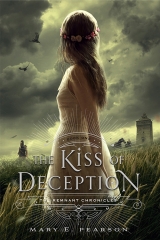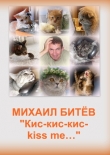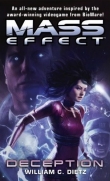
Текст книги "The Kiss of Deception"
Автор книги: Mary E. Pearson
Жанры:
Научная фантастика
,сообщить о нарушении
Текущая страница: 12 (всего у книги 20 страниц)
“Even if it’s not a vision,” Pauline said, “it could still be a gift. There could be other kinds of knowing.”
A chill clutched my spine. “What did you say?”
She repeated her words, almost the same ones the priest had used this morning.
She must have seen the distress on my face, because she laughed. “Lia, don’t worry! I’m the one with the gift of seeing! Not you! In fact, I’m having a vision now!” She bounced to her feet and held her hands to her head in mock concentration. “I see a woman. A beautiful old woman in a new dress. Her hands are on her hips. Her lips are pursed. She’s impatient. She’s—”
I rolled my eyes. “She’s standing behind me, isn’t she?”
“Yes, I am,” Berdi said.
I spun and saw her standing in the tavern doorway just as described.
Pauline squealed with delight.
“Old?” Berdi said.
“Venerable,” Pauline corrected and kissed her cheek.
“You two ready?”
Oh, I was ready. I had been waiting for this night all week.
Crickets chirped, welcoming the shadows. The sky over the bay was draped with thin streamers of pink and violet while the rest deepened to cobalt. A bronzed sickle moon held a pinprick star. Terravin painted a magical landscape.
The air was still and warm, holding the whole town suspended. Safe. When we reached the main road, a crisscross of paper lanterns twinkled overhead. And then, as if the landscape alone weren’t enough, the song.
The prayer was sung as I’d never heard it sung before. A remembrance here. Another there. Voices separate, combining, gathering, giving, a melody coming together. It was sung at different paces, different words rising, falling, streaming like a choir washed together in a cresting wave, aching and true.
“Lia, don’t cry,” Pauline whispered.
Was I? I reached up and felt my cheeks, wet with tears. This was not crying. This was something else. As we got closer to town, Berdi’s voice, with the most beautiful timbre of all, moved from song to greetings, the remembrances melting into the now.
The smithy, the cooper, the fishermen, this craftsperson, that dressmaker, the clerks of the mercantile, the soap maker who reminded Berdi she had some new scents she must try, they all offered their greetings. Soon Berdi was pulled away.
Pauline and I watched the musicians setting up, placing three chairs in a half circle. They set their instruments—a zitarae, fiola, and goblet drum—on the chairs and went to find some food and drink before their music began. While Pauline wandered off to sample the pickled eggs, I walked closer to examine the zitarae. It was made of deep-red cherrywood inlaid with thin seams of white oak and had worn marks where hands had rested through hundreds of songs.
I reached down and plucked one string. A dull pang rang through me. On rare occasions, my mother and her sisters would play their zitaraes, the three of them creating haunting music, my mother’s voice wrenching and wordless like an angel watching creation. When they played, a chill ran through the citadelle and everything stopped. Even my father. He’d watch and listen from a distance, hidden away on the upper gallery. It was the music of her homeland, and it always made me wonder what sacrifices she had made to come to Morrighan to be its queen. Her sisters had followed two years later to be with her, but who else had she left behind? Maybe as he listened and watched, that was what my father was wondering too.
More people arrived for the evening festivities, and the chatter and laughter grew to a soothing buzz. The celebration had begun, and the musicians took their seats, filling the air with welcoming tunes, but something was still missing.
I tracked down Pauline. “Have you seen him?” I asked.
“Don’t worry. He’ll be here.” She tried to pull me away to watch the lighting of the floating candles in the plaza fountain, but I told her I’d catch up with her later.
I stood in the shadows outside of the apothecary and watched the hands of the zitarae player press and pluck, a mesmerizing dance in itself. I wished my mother had taught me how to use the instrument. I was about to walk closer when I felt a hand on my waist. He was here. Heat rushed through me, but when I turned, it wasn’t Rafe.
I sucked in a surprised breath. “Kaden.”
“I didn’t mean to startle you.” His eyes traveled over me. “You look radiant tonight.”
I looked down, embarrassed, guilt pinching me for being too generous with my attentions last night. I looked back at him and smiled. “Thank you.”
His head motioned toward the street where people were dancing. “The music’s playing,” he said.
“Yes. It just started.”
His damp blond locks were combed back, and the scent of soap was still fresh on his skin. He nodded again toward the music, awkwardly boyish, though there was nothing else boyish about him. “Can we dance?” he asked.
I hesitated, wishing they were playing a faster jig. I didn’t want to lead him on, but I couldn’t refuse a simple dance either. “Yes, of course,” I answered.
He took my hand and guided me to the space set aside in front of the musicians for dancing. One of his arms slid behind my back, and the other held my hand out to the side. I made sure our conversation was full, recounting the day’s games so we could maintain some distance, but when talk lulled only briefly, he tugged me closer. His touch was gentle but firm, his skin warm against mine.
“You’ve been kind to me, Lia,” he said. “I—” He paused for a long while, his lips slightly parted. He cleared his throat. “I’ve enjoyed my time here with you.”
His tone had turned strangely solemn, and I saw the same gravity in his eyes. I looked at him, confused at this sudden change in his demeanor.
“I’ve done little enough for you, Kaden, but you saved my life.”
He shook his head. “You managed to break free. I’m sure you’d have been just as capable with your knife.”
“Maybe,” I said. “But maybe not.”
“We’ll never know what might have been.” His fingers tightened on mine. “But we can’t dwell on the maybes.”
“No … I suppose we can’t.”
“We have to move on.”
Every word from him was weighted, as if he was thinking one thing but saying another. The unrest that had always lurked in his eyes doubled.
“You sound like you’re leaving,” I said.
“Soon. I have to return to my duties at home.”
“You never told me where home is.”
Lines deepened around his eyes. “Lia,” he said hoarsely. The music crawled, my heart thumped faster, and his hand slid lower on my back. Tenderness replaced the unrest, and his face dipped close to mine. “I wish—”
A hand came down on his shoulder surprising us both. Rafe’s hand.
“Don’t be piggish, man,” Rafe said cheerfully, but with a mischievous gleam in his eyes. “Give the other fellows a chance.”
Astonishment paraded across Kaden’s face as if Rafe had dropped from the sky. In an instant, his surprise was replaced with a scowl. He looked from Rafe to me, and I shrugged to show it was only polite to dance with everyone. He nodded and stepped aside.
Rafe slid his arm around me and explained he was late because the clothes he had laid out at the bathhouse had somehow gotten up and walked off by themselves. He’d finally had to make a mad dash to the barn loft with only a towel to cover him. He eventually found his clothes tossed in Otto’s stall. I suppressed a giggle, imagining him running to the loft draped only in a towel.
“Kaden?”
“Who else?”
Rafe pulled me closer, and his fingers gently strummed my spine. Hot splinters whirled in my stomach. We had only seconds together before the music changed to a fast jig. Soon we were pulled apart by the swift exchange of partners. The pace was brisk, and I found myself laughing, the lights twinkling and swirling past my view, more joining in, Pauline, Berdi, Gwyneth, priests, the farrier, little Simone holding her father’s hand, strangers I didn’t know, everyone singing, hooting, stepping into the center circle to show off a few fancy steps, the zitarae, fiola, and drum thrumming at our temples.
My face damp with the revelry, I finally had to catch my breath and step back to watch. It was a fast whirl of color and movement, Rafe dancing with Berdi, the seamstress, schoolgirls, Kaden taking Pauline’s hand, Gwyneth with the tanner, the miller, an endless circle of celebration and thanks. Yes, that’s what it was, thankfulness for this one moment, regardless of what the morrow might bring.
The words Rafe had spoken rang clear again. Some things last … the things that matter. The very words I had scoffed at only weeks ago now filled me with wonder. Tonight was one of those things that would last—what I was witnessing right now at this very moment—and I saw a time past, a time even before that, the Ancients dancing in this very street, breathless, feeling the same joy I was experiencing now. The temples, the wondrous bridges, the greatness may not last, but some things do. Nights like this. They go on and on, outlasting the moon, because they’re made of something else, something as quiet as a heartbeat and as sweeping as the wind. For me, tonight would last forever.
Rafe spotted me on the fringe of the crowd and slipped away too. We walked through the plaza that was flickering with floating candles, the music fading behind us, and we disappeared into the dark shadows of the forest beyond, where no one, not Kaden, Pauline, or anyone else could find us.
CHAPTER THIRTY-SEVEN
I stretched in the bed, my legs sliding along the cool sheets and smiled again. I had half slept, half dreamed, and half relived every moment all night long—too many halves to fit into one night.
There was a bond between us I couldn’t name. A sadness, a regret, a falling short, a past. I saw the yearning in his eyes, not just for me but for something more, a peace, a wholeness, and I wanted to give it to him.
I was immersed again in his tenderness … his finger tracing a line down my shoulder, slipping my strap free so he could kiss my back, his lips barely brushing along my kavah, my whole body tingling at his touch, our lips meeting over and over again.
From the first day, Lia, I wanted this, wanted you.
Our fingers laced together, tumbling in a bed of leaves, my head resting on his chest, feeling the beat of his heart, his hand stroking my hair.
I took a deep breath. I had to get some sleep, but I couldn’t stop reliving it. I hadn’t thought it could be this way. Ever. With anyone.
We had talked for hours. He loved fishing from a riverbank, but he rarely had the time. He hesitated when I asked about his parents, but then told me they had died when he was young. He had no one else, which explained why he had no schooling in the Holy Text. He had worked on a farm, mostly tending the horses and other livestock, but also helping with the fields. Yes, melons were one of the things they grew, just as I had imagined. He hated pigeon meat and was glad we left the dinner early yesterday. I shared my stories too, mostly about forays into the mountains or forests with my brothers, who remained unnamed. I was careful to leave royal details out. He was surprised to learn I had favored swordplay over stitchery, backroom card games over music lessons. He promised to challenge me to a game one day.
It was late when he walked me back. Pauline had left the lantern out for me. Our words just kept stringing on and on, always one more thing to say to keep us from parting, one more thing we needed to share. Finally I kissed him one last time and told him good night, but as I reached for the door handle, he stopped me.
“Lia, there’s one more thing, something else I need to—”
“Tomorrow, Rafe. We have all day tomorrow. It’s late.”
He nodded, then lifted my hand to his lips and left.
A perfect night … a perfect forever.
I was in that half-awake dreamworld all night long, until the early morning hours, when the first muted light tiptoed along the edge of the window, and my dreams finally gave way to sleep.
CHAPTER THIRTY-EIGHT
“Lia.”
A nudge on my shoulder.
“Lia, wake up.”
Another nudge.
“Lia! You have to wake up!”
I startled awake, sitting upright. Pauline sat on the edge of the bed. The room was bright. I had slept all morning.
“What is it?” I said, shielding my eyes against the light. And then I noticed Pauline’s expression. “What?”
“It’s Walther. He’s behind the icehouse. Something’s wrong, Lia. He’s—”
I was out of the bed, groggy, rummaging for pants, a shirt, something to throw on. Walther behind the icehouse? My palms were damp with sweat. Pauline’s voice was shrill. Something’s wrong. I threw down whatever was bunched in my hands and ran out of the cottage barefoot and in my nightdress.
I saw his tobiano first, lathered and snorting, as if it had been ridden all night. “Take him to the barn and wipe him down,” I called to Pauline, who was running behind me. I rounded the corner of the icehouse and saw Walther sitting on the ground, leaning against a broken overturned wheelbarrow that was stored there along with unused crates and a jumble of other castoffs:
“Lia,” he said when he saw me.
My breath stopped dead against my ribs. He had a gash on his forehead, but worse, his expression was crazed—this was a wild man pretending to be my brother.
“Walther, what is it?” I rushed to his side and fell to my knees. My hand went to his forehead, and he looked at me and said “Lia” again, as if it were the first time.
“Walther, you’re hurt. What happened?”
His eyes were desolate. “I have to do something, Lia. I have to do something.”
I took his face in my hands, forcing him to look at me. “Walther, please,” I said firmly. “You have to tell me what’s wrong so I can help you.”
He looked at me, almost like a child. “You’re strong, Lia. You were always the strongest of us. That’s what worried Mother.”
He was making no sense at all. His gaze drifted away, and his eyes were glassy and rimmed in red. “There was nothing I could do,” he said. “Not for either of them.”
I grabbed his shirt and shook him. “Walther! What happened?”
He looked back at me, his lips cracked, his hair falling in his face in filthy, oily strands. His voice was passionless. “She’s dead. Greta’s dead.”
I shook my head. It wasn’t possible.
“An arrow straight through her throat.” His gaze remained vacant. “She looked at me, Lia. She knew. Her eyes. She couldn’t speak. She just looked at me, knowing, and then she fell forward into my lap. Dead.”
I listened as my brother recounted each shattered piece of his dream. I held him, rocked him, huddled with him in the squalor and mud. When I saw Pauline and Berdi round the corner of the icehouse, I waved them away. My brother, my strapping soldier brother, wept in my arms. He straddled a line between tears and dispassionate belief and told me every detail, unable to separate the relevant from the inconsequential. Her dress was blue. She had braided her hair in a circle around her head that morning. The baby was moving. They were on their way to Greta’s aunt’s house. It was only an hour’s ride in the carriage from her parents’ manor. Her sister and her family were in the carriage just behind them. They were going to have lunch. Only an hour he repeated over and over again. An hour. And daylight. It was daylight. They were just about to cross the bridge from Chetsworth into Briarglen when there was a tremendous roar. He heard the driver shout, there was a loud thump, and then the carriage lurched. He was about to look out and see what had happened when he heard another sound, the thump, thump, thump of arrows. He turned to shove Greta down, but it was too late.
“They were there to destroy the bridge,” he said. His eyes were wide, his voice numb again, like he had replayed the scene over in his own head a thousand times already. “We came along just as it was going down. The driver shouted at them, and they killed him. Then sprayed us with more arrows before they galloped off.”
“Who, Walther? Who did this?”
“I took her back to her parents. I knew that’s where she’d want to go. I took her back, Lia. I washed her. I wrapped her in a blanket and held her. Her and the baby. I held her for two days before they made me give her to them.”
“Who did this?”
He looked at me, his eyes suddenly focused again, his mouth contorting in disgust as if I hadn’t been listening. “I have to go.”
“No,” I whispered softly trying to soothe him. “No.” I reached up to push his hair aside and check the gash in his forehead. He hadn’t told me how he got it. In his crazed state, he probably didn’t even know it was there.
He pushed my hand away. “I have to go.”
He tried to get up, and I pushed him back against the carcass of the wheelbarrow. “Go where? You can’t go anywhere like—”
He pushed me away roughly, and I fell back. “I have to go!” he yelled. “My platoon. I have to catch up.”
I ran after him, pleading for him to stop. I pulled on him, begging him to wait, to at least let me wash his wounds, feed him something, clean his blood-soaked clothing, but he didn’t seem to hear me. He grabbed the reins of his tobiano and led him out of the barn. I yelled. I held on. I tried to pull the reins from him.
He spun, grabbed both of my arms, shook me, screamed. “I’m a soldier, Lia! I’m not a husband anymore! I’m not a father! I’m a soldier!”
Rage had made him into someone I didn’t know, but then he pulled me to his chest and held me, sobbing into my hair. I thought my ribs would crack under his grip, then he pushed away and said, “I have to go.”
And he did.
And I knew there was nothing I could do to stop him.
CHAPTER THIRTY-NINE
It can take years to mold a dream. It takes only a fraction of a second for it to be shattered. I sat at the kitchen table, holding a piece of Walther’s shattered dream. Gwyneth, Berdi, and Pauline sat with me.
I had already told them everything I knew. They tried to reassure me that Walther would be all right, that he needed time to grieve, that he needed a lot of things I couldn’t even hear them saying anymore. Instead my head throbbed with my brother’s cries. An arrow straight through her throat.
Their voices were soft, tentative, quiet, trying to help me through this. But how could Walther ever be all right? Greta was dead. She fell open-eyed into his lap. Walther didn’t leave here as a soldier, he left as a crazed man. He didn’t leave to go join his platoon—he left to get his revenge.
Gwyneth reached out and touched my hand. “It’s not your fault, Lia,” she said as if she could read my thoughts.
I pulled my hand away and jumped up from the chair. “Of course it’s my fault! Who else’s would it be? Those packs of hyenas are ranging right into Morrighan now because they’re no longer afraid! All because I refused to marry someone I didn’t love.” I spit the last word out with every bit of the revulsion I was feeling.
“No one knows with certainty if an alliance would have done anything to stop them,” Berdi tried to reason.
I looked at her, shaking my head, thinking that certainty didn’t matter in the least anymore. Guarantees weren’t even part of my universe right now. I would have married the devil himself if there had been even the slimmest chance it could have saved Greta and the baby. Who would be next?
“It’s only one rogue band, Lia, not an army. We’ve always had those. And the attack was on a remote border,” Pauline argued.
I walked over to the fireplace and stared at the small flame. She was right on that count. But this time it was something more. I could feel it. It was something gray and grim slithering through me. I remembered the hesitation in Walther’s voice. We’ll drive them out. We always have. But not this time.
It had been brewing all along. I just hadn’t seen it. A crucial alliance, my mother had called it. Was sacrificing a daughter the only way to achieve it? Maybe it was when so much distrust had been banked for centuries. This alliance was meant to be more than a piece of paper that could be burned. It was to be an alliance made of flesh and blood.
I look down at the tiny white lace cap in my hands that I had planned to give to Walther and Greta. I fingered the lace, remembering the joy I had in buying it. Greta was dead. The baby was dead. Walther was a crazed man.
I tossed it into the fire, heard the hushed breaths around me, watched the lace catch, curl, blacken, flame, become ash. As if it was never there.
“I need to go wash up.” My legs were still caked in mud.
“Do you want me to come with you?” Pauline asked.
“No,” I answered, and quietly closed the door behind me.
On the far side of death,
Past the great divide where hunger eats souls,
Their tears will increase.
–Song of Venda
CHAPTER FORTY
Thunk.
Thunk.
Thunk.
Thunk.
I had been standing in the meadow for two hours, throwing my knife over and over again. It was a small stump, and I rarely missed anymore. I had trampled the wild mustard down into a straight neat path from going to retrieve the knife. There were only a few stray throws when I had allowed my mind to wander.
Thunk.
Thunk.
And then the whir, the chink, the swish of it missing its mark and disappearing into the tall grass behind the stump. Walther’s words, Walther’s face, Walther’s anguish wouldn’t leave me. I tried to sort it all into something that made sense, but there was no sense, not when it came to murder. Greta wasn’t a soldier. The baby hadn’t even drawn a first breath. Savages. I went to find my knife, lost somewhere in the grass.
“Lia?”
I turned. It was Kaden. He swung down from his horse. I knew by his manner he had heard something, probably from hushed voices in the tavern.
“How did you find me?”
“It wasn’t hard.”
The meadow bordered the road leading out of town. I supposed I was in full view of anyone passing by.
“Berdi said you and Rafe went out early this morning. Before sunup.” I listened to the flatness of my voice. It sounded like it belonged to someone else.
“I don’t know where Rafe went. I had some arrangements to take care of.”
“The duties you spoke of.”
He nodded.
I looked at him, his hair blowing in the breeze, a white burnished gold in the bright midday sun. His eyes rested on me, sure and steady.
I kissed his cheek. “You’re a good person, Kaden. Steadfast and true to your duty.”
“Lia, can I—”
“Go away, Kaden,” I said. “Go away. I need time to think about my own duties.”
I turned and walked back through the meadow, not waiting to see if he listened to me or not, but I heard his horse trot off. I retrieved my knife from the grass and threw it again.
Her dress was blue. The baby was moving.
I have to do something, Lia. I have to do something.
This time I saw more than Walther’s face. More than Greta’s.
I saw Bryn. I saw Regan.
I saw Pauline.
I have to do something.
CHAPTER FORTY-ONE
RAFE
It was twilight when I returned. I hadn’t eaten all day, and my head was pounding. I led my horse to the barn and unsaddled him, feeling the burn of wind and sun on my skin from a long day of riding. I was tired, still trying to sort the timing of everything out. How would we pull this off? I raked my fingers through my hair. I hadn’t planned my trip well, but after the late night with Lia, I’d had little sleep.
“We need to talk.”
I looked over my shoulder. I was so preoccupied I hadn’t heard her come in. I heaved my saddle onto the rack and faced her. “Lia—”
“Where did you go?” Her shoulders were stiff, and her tone curt.
I took a hesitant step toward her. “I had some business to take care of. Is that a problem?”
“An out-of-work farmhand with business?”
What was wrong with her? “I told you my lack of work was temporary. Supplies needed to be ordered.” I threw the horse blanket still in my hands over the stall wall and closed the space between us. I looked into her eyes, wanting to kiss every black lash, wondering how this had happened to me. She reached up and pulled my face down to hers, pressed her lips hard against mine, then her hands slid down my neck to my chest, and her fingers dug into my skin. It wasn’t desire I heard in her breaths, but desperation. I pulled back. I stared at her and touched my lip where her rough kiss had nicked my flesh.
“Something’s wrong,” I said.
“I’m leaving, Rafe. Tomorrow.”
I stared at her, not quite understanding what she was saying. “What do you mean, leaving?”
She walked over to a bale of hay in an empty stall and sat, looking up at the rafters. “I have to return home,” she said. “I have an obligation I need to meet.”
Home? Now? My mind raced. “What kind of obligation?”
“The permanent kind. I won’t be back.”
“Ever?”
She stared at me, her expression blank. “Ever,” she finally said. “I haven’t told you everything about my family, Rafe. I’ve been manipulated and lied to my entire life. I’m not going back because I want to, but one fact remains—I’ve caused them and others a lot of pain through my disloyalties. If I don’t go back, I may cause far more. I need to return to live up to my duty.”
Her voice was rigid and unfeeling. I rubbed my chin. She looked so different. A different Lia than I had ever seen. Manipulated and lied to. I glanced away and felt my eyes darting back and forth, unable to focus. I tried to sort through what she had said and refigure my own thwarted plans at the same time. I looked back at her. “And your family will give you this chance?”
“I don’t know. But I have to try.”
Tomorrow. I’d thought I had more time. It was too soon. The plans—
“Rafe?”
“Wait,” I said. “Let me think. I have to figure this out.”
“There’s nothing to figure out.”
“Does it have to be tomorrow? Can’t it wait a few more days?”
“No. It can’t wait.”
She sat stone still. What had happened while I was gone? But it was obvious her decision was made and final.
“I understand about duty, Lia,” I said, trying to buy time and think this through. “Duty is important.” And loyalty. I swallowed, my throat dry with road dust. “When will you leave tomorrow?” I asked.
“In the morning. Early.”
I nodded, even as my mind reeled. That gave me very little time. But one thing I knew with certainty, I couldn’t let her go back to Civica.
CHAPTER FORTY-TWO
There wasn’t much to pack. Everything I had would fit into a double-sided saddlebag with room to spare. I wasn’t bringing the new clothes I’d bought. I’d leave those here for Pauline, since I couldn’t wear them in Civica anyway. I’d bring some food too, but this time I’d be staying at inns along the way. That was one of the concessions I’d made when Pauline angrily threw the pouch of jewels I had given her back in my face. We had argued all afternoon. There had been words with Berdi too, but she finally accepted that I had to go. As for Gwyneth, I think she knew all along, even before I did.
But Pauline had become fierce in a way I had never seen. She finally stomped off to the tavern when I pulled my bag from the wardrobe. I couldn’t tell her that hers had been one of the faces I had seen in the meadow. A face like Greta’s, open-eyed but not seeing, another casualty if I didn’t do something.
Whether the alliance ended up being effective or not, I couldn’t take the chance of even one more person I loved being destroyed if I might have been able to prevent it. I looked around the small cottage to see if I had forgotten anything and saw my garland of lavender flowers hanging from the bedpost. I couldn’t take it with me. The dried flowers would only be crushed in the saddlebag. I lifted it from the bedpost and held it to my face, sniffing the fading scent. Rafe.
I closed my eyes, trying to force the sting. Even though there was nothing he could say or do to make me change my mind, I’d thought he’d at least try to talk me out of it. More than try—demand. I had wanted him to talk me out of it, to give me a hundred reasons why I should stay. He hadn’t even given me one. Was it that easy to let me go?
I understand about duty.
I swiped at the tears rolling down my cheeks.
Maybe he had seen it in my face. Maybe he’d heard the resolve in my voice. Maybe he’d been trying to make it easier for me. I took a slow deep breath.
Maybe I was just making excuses for him.
Lia, I have to take care of something early, but mid-morning I’ll meet you at the blue cistern for one last good-bye. You shouldn’t be farther than that by then. Promise you’ll meet me there.
What good would one last good-bye do? Wouldn’t it just prolong the pain? I should have told him no, but I couldn’t do that either. I saw the anguish in his face, as if he were battling something large and cruel. My news had jolted him. Maybe that was all I needed, some sign that he didn’t want me to go.
He had pulled me into his arms and kissed me gently, sweetly, like the first time he had kissed me, remorseful as he had been that night.
“Lia,” he whispered. “Lia.” And I heard the words I love you, even if he didn’t say them.
CHAPTER FORTY-THREE
I hugged Berdi. Kissed her cheek. I hugged her again. I’d already said my good-byes last night, but Berdi and Gwyneth were both out on the tavern porch again early this morning with enough food stuffed into burlap sacks to feed two.
Rafe and Kaden were both gone before I was up. I was sorry I didn’t at least get to say good-bye to Kaden, but I knew I’d see Rafe later at the cistern. What was all this business he suddenly had to take care of? Maybe today was the day everyone had to live up to past lives and duties. Pauline and I had had more words before we went to bed, and she was out of the cottage even before I was this morning. There had been no good-byes between us.
I hugged Gwyneth. “You’ll look after Pauline, won’t you?”
“Of course,” she whispered.
“Watch your mouth, now, you hear?” Berdi added. “At least until you get there. And then you give them an earful.”
There was the real possibility I wouldn’t be given the chance to say anything. I was still a deserter. A traitor. But certainly even my father’s cabinet could see the advantage at this point of setting my transgressions aside and at least letting me try to win back the good graces of Dalbreck.
I smiled. “An earful,” I promised her.
I lifted the two sacks and wondered how I was going to load all of this onto Otto.
“Ready?”
I spun around.
Pauline was dressed in her riding clothes with Nove and Dieci tacked up and in tow.








